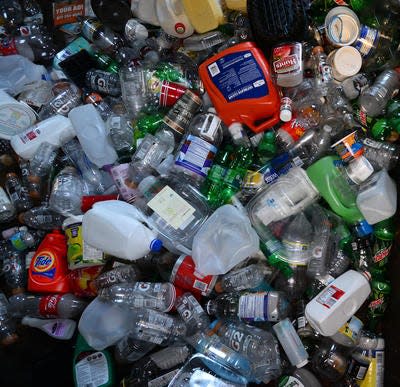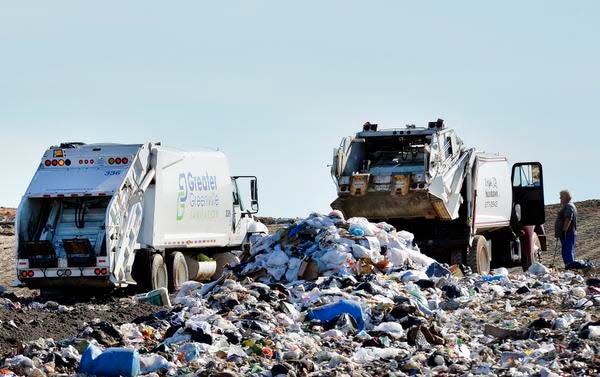More residents, more trash: Greenville County to add to landfill and helm compost program
As South Carolina’s Upstate region continues to grow, so does the amount of waste generated each day. In response, the Twin Chimneys landfill in the southern part of the county is adding more storage for trash.
The county is working on a 10-acre expansion of the landfill to add capacity through 2029. They’ll also operate a composting program. Composting is a process where waste like yard trimmings and food can be turned into fertilizer.
Marcia Papin, the landfill’s director, said she expects construction to be fully completed in March of 2025, though the initial land clearing has already begun. The composting program, however, could be up and running far sooner.
The project will cost an estimated total of $11.3 million, according to Greenville County Administrator Joe Kernell.

Why do we need more landfill space?
South Carolina is growing exponentially. In 2023, the Palmetto state experienced the highest percentage of population growth in the United States. In Greenville County alone, the South Carolina Revenue and Fiscal Affairs office estimates more than 86,200 new residents between 2025-2035.
Where there are more people, there’s more trash. That’s why Twin Chimneys works to build more cells, or the part of a landfill where trash is held, roughly every two years.
"You don't build the whole footprint of the landfill at one time it would be outrageously expensive, and then it would be exposed to the weather," Papin said. "The early landfills that the county operated had really short lives, like 10 years. So, the county's goal when they built this landfill was to look back and then say 'We want to go ahead and provide for landfill space for a really long period of time.'"
Twin Chimneys receives roughly 1,000 tons of waste each day. When trash comes into the landfills, it’s crushed down to save space and is measured in cubic yards.
The 1,155-acre landfill is permitted to hold about 42 million cubic yards of trash, which the county estimates will last for about 50 more years. Currently, Twin Chimneys has only used about 14.3% of the total space.
The new cells will be class three landfills, which means they will hold municipal solid waste, or the trash from your house. Class three landfills are unique because each cell is lined along the bottom with clay and plastic to prevent contaminants from seeping into the ground.
Construction of a new landfill cell takes about a year, Papin said. She added that it costs roughly $800,000 per acre to build a class three landfill.
While the cost of the project is not listed on the proposal, Greenville’s County Council recently approved $11.5 million for new cells at the Twin Chimneys facility, and it's estimated to cost $11.3 million, according to the county. The money comes from a general obligation bond, which is a type of borrowing where the state issues money to municipalities that will eventually be paid back.
To build the new cells, the county recently sought proposals from environmental engineering firms. Since landfill expansion only happens every few years, Papin said they don’t retain engineers on staff. A consulting firm may be chosen in the next few weeks.

What is composting? Why do we need it?
Composting happens when organic matter is recycled to create a nutrient-rich fertilizer. It helps give food waste another purpose instead of just decomposing in a landfill.
In South Carolina, about 30% of waste each year is made up of yard trimmings and food waste, according to the Department of Health and Environmental Control. These are the primary sources of waste used to make compost.
"Compost is basically a recipe. It's a certain amount of nitrogen mix to a corresponding amount of what we call carbon," Papin said.
The carbon mix comes from yard waste, like leaves and branches. Twin Chimneys already accepts yard waste, but Papin said they’re on the hunt for the nitrogen component, which is essentially food waste.
The composting process takes about 45-55 days. Once it's finished, local businesses can take the fertilizer from the landfill. Papin said many companies have already expressed interest in taking the county’s finished product.
"There's an end market for it, so that's the definition of a healthy, circular program," Papin said.
Previously, Spartanburg-based company Atlas Organics manned the compost program at the Twin Chimneys site before moving to a different location. Now, the county will take over the composting.
Since the infrastructure to compost already exists, the county won’t need to build anything else to get the program off the ground.
Greenville County will work with hospitals and schools by taking their food waste. The county is also planning to collect food waste from some of Atlas Organics’ former clients in the area. Greenville County will be the fourth permitted food waste composter in South Carolina, county spokesperson Bob Mihalic said.
According to DHEC, the county’s composting permit application is under review. Papin said she expects to receive it soon.
Greenville County won’t start collecting compostable food waste with weekly trash pickup, but Papin said the county will work other companies to collect it. One of those companies is Smart Recycling, a group that helps businesses transport food waste to landfills.
Papin said they also hope to put composting bins in recycling centers, and that surrounding counties will follow. She said this program just a starting point in terms of how Greenville County is aiming to keep waste out of landfills and reuse it.
:We hope that down the road we'll start finding more uses for the materials that are going into the land, like food waste composting, which we're doing right now on a very small scale," she said.
Sarah Swetlik covers climate change and environmental issues in South Carolina's Upstate for The Greenville News. Reach her at sswetlik@gannett.com or on X at @sarahgswetlik.
Have a question for Sustainability with Sarah? Ask here or email sswetlik@gannett.com.
This article originally appeared on Greenville News: More people, more trash: Greenville landfill adds capacity, composting
